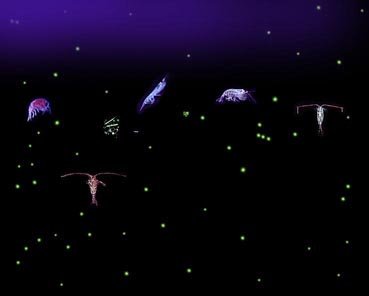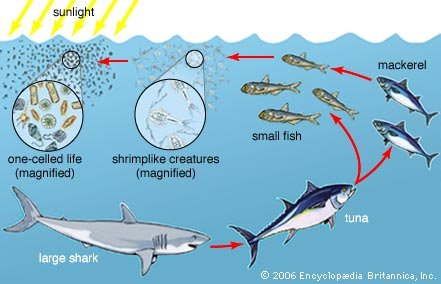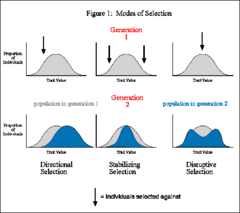Dynamic Selection within Diverse Plankton Communities Maintains Productivity in the Ocean
New Results based on Oceanic Observations

Newly published results by Pedro Cermeño et al. Frontiers in Marine Science (2016) clarify how biodiversity sustains high productivity in the ocean despite ever-changing environmental conditions. I know both Pedro and his co-author Sergio Vallina personally. They’re both brilliant and hard-working scientists. But, that’s not why I’m posting about this. My interest here is both in the plankton ecology itself and in the analogy to economics.
They analyzed observations of the diversity and productivity of phytoplankton (algae that are passively moved around by the water). Phytoplankton grow via photosynthesis, and thereby constitute the base of the food web in the ocean as well as in freshwater. Their growth, termed Primary Production, is essential for sustaining basically everything higher on the food chain, including zooplankton (animal plankton), small fish, marine mammals, even seabirds, and ultimately humans too.

Ecological Mechanisms
More diverse communities and ecosystems tend to be more productive than less diverse ones, although the relationship is sometimes unimodal (greatest productivity at intermediate diversity). There are two main mechanisms behind this increase of productivity with diversity. Although both are well known to be important, their relative contributions, like biodiversity-productivity relationship, have been hotly debated in ecology.
Complementarity
Different species with different specializations (niches) do better under different conditions. This means that a diverse community will have more chances to fully exploit available resources, either over a heterogeneous (non-uniform) domain in space, or in time. The availability of light and nutrients vary greatly with the seasons, for example, and hence temporal complementarity enhances productivity: some species do better in spring, others in summer, others in autumn or winter. See my previous post for more about complementarity in ecosystems and economies.
Selection Effect
But the composition of communities and ecosystems does not remain fixed, and that’s a good thing. It changes dynamically as some species are better competitors under different conditions. A classic example is the shift from larger plankton species dominating in springtime to smaller species in the summer. The figure below puts it in terms of “modes of selection”. In other words, selection does not necessarily reduce diversity, particularly if conditions persistently change:

Selection from Diverse Communities is the Key
This paper clarifies that selection, by dynamically re-shaping plankton communities, is a key mechanism for sustaining productivity. Of course such selection can only operate effectively to the extant that the community contains sufficient diversity. So, it’s not that the most productive species completely ‘out-compete’ all others, reducing biodiversity. It’s just that the balance shifts towards the more productive species at each place and time. As the authors state in the final sentence of their abstract:
We suggest that the maintenance of phytoplankton species richness is essential to sustain marine primary productivity since it guarantees the occurrence of highly productive species.
Economic Implications
Even if a select few are responsible for most of the productive activity at any given place and time, that situation is likely to change. Others will likely be the most productive later, or in different locales. This is one reason why sustaining a diversity of aptitudes, interests, and skillsets may benefit human communities. In a market economy, the choices of consumers select for the producers who best satisfy the changing tastes of the masses. This leads to Creative Destruction as resources are continually re-allocated to produce different goods and services, or to produce the same ones more efficiently. Steemit in particular does this, in a way that most social media does not.
--Ludwig von Mises
Nature has developed diversity-sustaining mechanisms, which we are only beginning to understand. Similarly, entrepreneurs and human societies maintain the necessary diversity of productive capacity. Loans and financial strategies, for example, keep producers of summer crops from going bankrupt during wintertime, and vice-versa.
S. Lan Smith
Kamakura, Japan
September 9, 2016
Thanks to those who provided the images used herein and made them available for free use.
Good post. yes the market is surely a process.
Glad you liked it.
Thanks for the feedback.
Wonderful post @lanimal.
Relating the natural world to economic principles is an interesting idea, and a good read. Thanks!
Thanks, and glad that you enjoyed it!
Thanks a lot for this post!
You're saying that the natural work is similar to a market economy, but isn't it the other way round? Nature always try to make the best out of what is available, doesn't it?
Thanks for the feedback. Yes, of course the natural world of ecosystems was there first. I actually consider humans, and the economies that we build, to be natural as well. They're only more recent than many other natural systems.
Nature does not always try to make the best out of what is available. It tends toward a good solution to problems that is applicable with the solutions being employed by other organisms.
This post has been linked to from another place on Steem.
Learn more about linkback bot v0.4. Upvote if you want the bot to continue posting linkbacks for your posts. Flag if otherwise.
Built by @ontofractal